Blue Light Affects Your Sleep. Here's What to Know

As a society it is becoming very common to see everyone with an electronic device whether they are young or old. Our devices are able to do everything for us. They have surpassed the days of simply making calls on the go.
They are our planners, our source of entertainment, our navigation system, and so much more. With more exposure to electronic devices people are starting to wonder how our bodies are reacting.
One area that has many people concerned is the effect of using an electronic device and the change in sleeping patterns. Sleep can easily be disrupted by an electronic device because we often lose track of time while playing games or surfing the web. Not getting enough rest not only affects our mental health the next day it can also affect our general health as well.
While we need to pay attention to how much time we are spending on devices the real problem lies in the light that these devices produce. Electronic devices produce blue light.
This light is responsible for the changes in our sleep patterns and the cause of many people's inability to fall asleep at night. While this light sounds bad it is actually naturally occurring.
With electronic devices we are getting more exposure to this naturally occurring light at the wrong time of day and causing our sleep cycles to change.
Cell Phone Blue Light
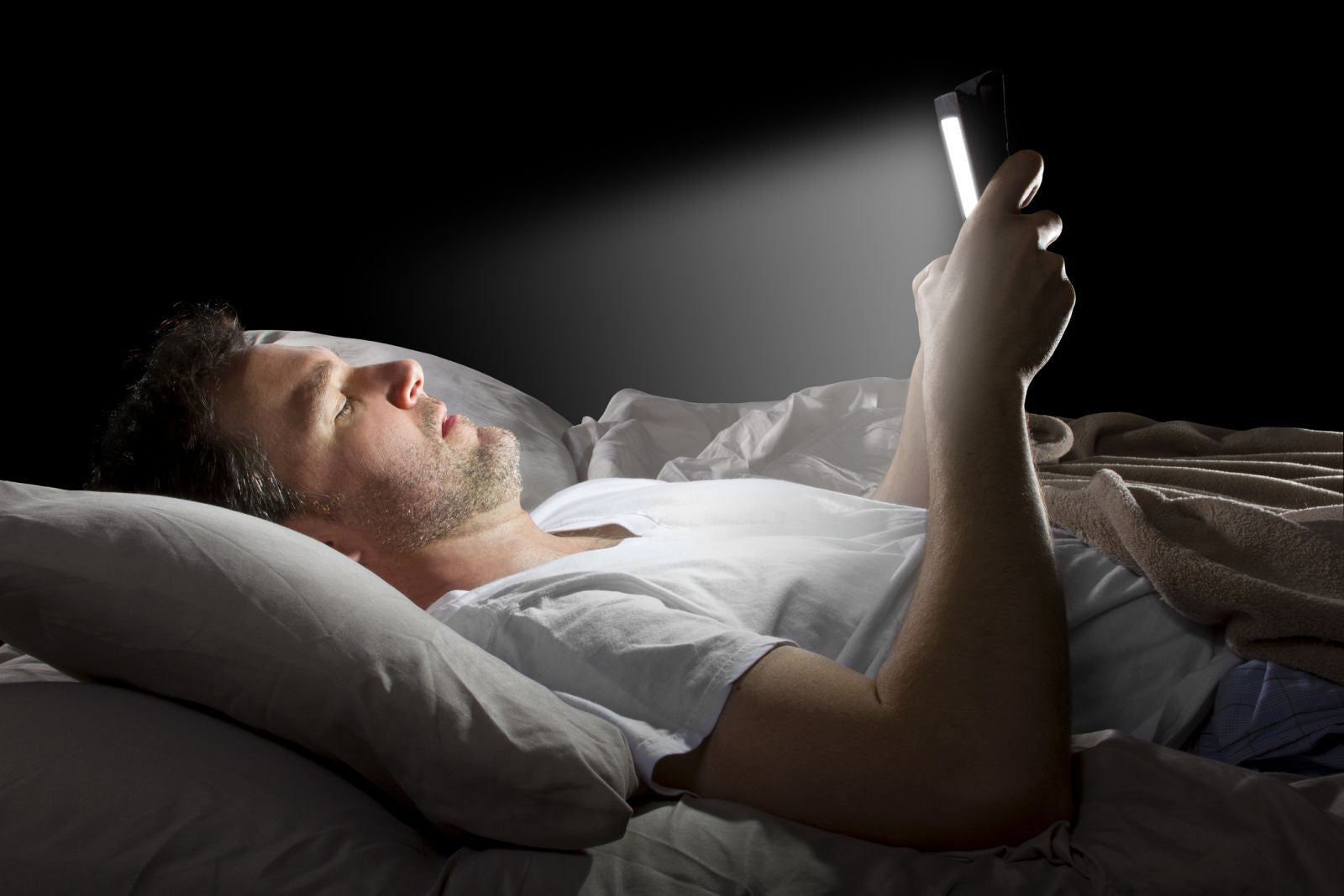
Image source: health.harvard.edu
Blue light is a naturally occurring light that is produced by the sun. It can also be produced by electronics like your cellphone. All light that is produced can be measured in nanometers and wavelengths. Light is measured in wavelengths and starting at the smallest wavelength you have ultraviolet light. As the wavelengths grow larger you end at infrared.
On this spectrum of light blue light comes after ultraviolet light. Blue light has the smallest wavelength of all lights on the spectrum that is visible to our eyes. When people are exposed to blue light their body stops producing melatonin. Many people get a typical amount of exposure to blue light caused by the sun. Which will allow them to go to sleep at night as the sun goes down.
The sun helps our bodies regulate our sleep. If we allow the sun to tell us when it is time to wake up and go to bed you can naturally train yourself to wake up in the morning.
As the sun comes out you will stop producing melatonin and become more alter. When the sun goes down your body will start to produce melatonin and be ready to sleep.
When using electronic devices at night you are telling your body to still avoid producing melatonin. Melatonin is needed for our bodies to get ready to sleep. This is the hormone that your body uses to help you feel tired. The hormone is released by the pineal gland.
It also regulates your circadian rhythm so you are able to get a good night's rest. It helps you feel less alert and you will want to sleep once it is being produce.
Circadian Rhythm
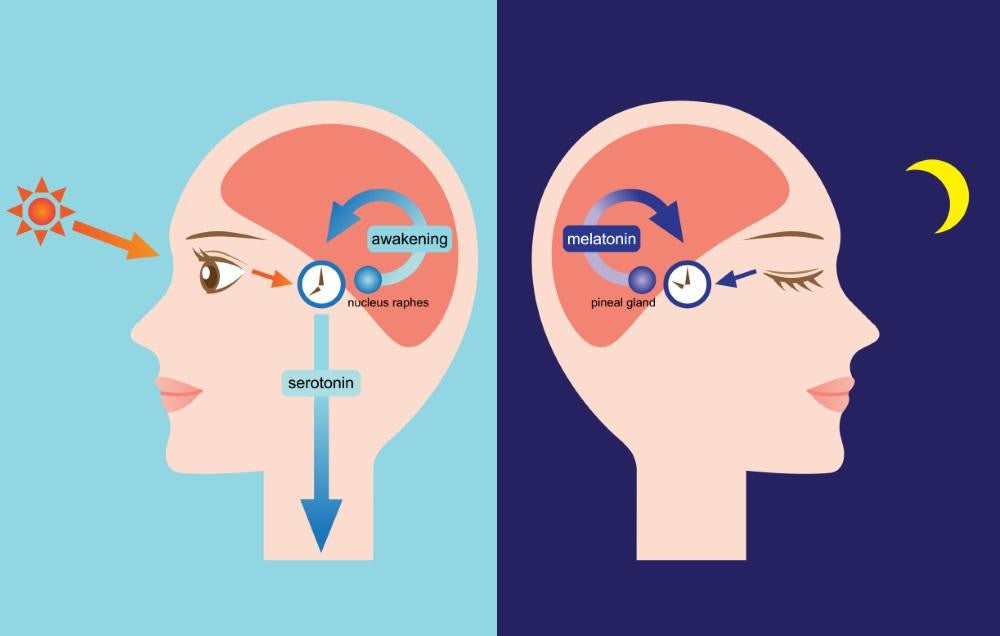
Image source: prevention.com
The Circadian Rhythm is the formal name for what many of us refer to as our internal clock. This internal clock typically tells people when it is time for them to rest and when it is time to wake up. Some people are more in tune with this internal clock and wake with the sunrise naturally and easily.
Sleep is dictated by the production of melatonin and melatonin is no longer produced when our body is exposed to sunlight or blue light. Every person has a different internal clock. However, our bodies still follow a similar twenty four hour cycle for sleep.
The blue light from electronic devices tells our bodies it is still time to be awake. Our bodies do not produce the melatonin needed to help us become sleepy and it can be much harder to fall asleep.
As we consistently use our phones throughout the night we are interrupting our natural circadian rhythm. Once this rhythm is off we do not have the quality sleep we need.
A Healthy Body is a Well Rested Body

When you do not get a good night's sleep you often feel more lethargic and unable to do anything the next day. While this is not enjoyable it is not the biggest problem with disrupting your circadian rhythm.
When you are not getting rest your body will not be as healthy. We have found health conditions like obesity, depression, diabetes, heart disease, and cancer are linked to poor sleep patterns.
Adults and children both need an adequate amount of sleep to be productive during the day. It is not always about the amount of sleep you get. It is about the quality of sleep you get.
A person may be able to sleep after using an electronic device but their circadian rhythm is thrown off. Their body will not go through the cycle of sleep properly and they will likely not feel well rested the next day.
Adolescents vs Adults
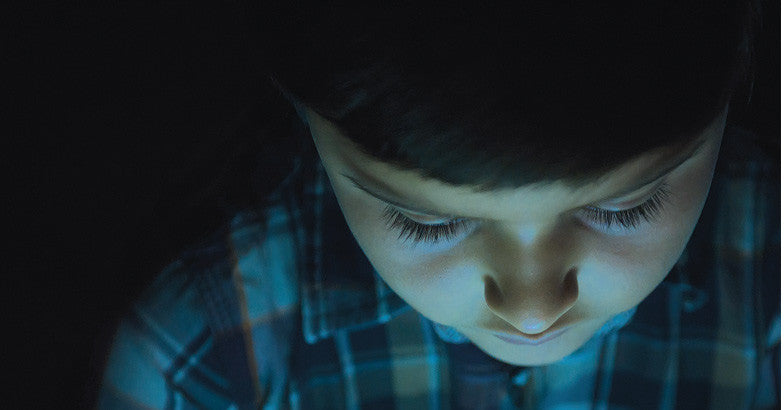
Image source: onmanorama.com
Exposure in adolescents and adults varies. Adolescents are more susceptible to blue light than adults are. When exposed to similar situations adults show a much higher level of melatonin despite the fact they were exposed to the same amount of blue light. Adolescents that had as much as one tenth of the exposure as an adult still produced less melatonin.
Another study focused on the length of time people were exposed to blue light. An iPad was used and people were exposed to its blue light with its brightness of full. The experiment lasted two hours.
It was noted that at the one hour mark there was a small change in melatonin production. At two hours this increased momentously. The longer these devices are used the less melatonin your body will be able to produce.
That spells bad news for anyone that uses electronics for long periods of time before they are going to sleep. Without taking precautions people who use these devices right before bed are not likely to get quality sleep.
Teenagers
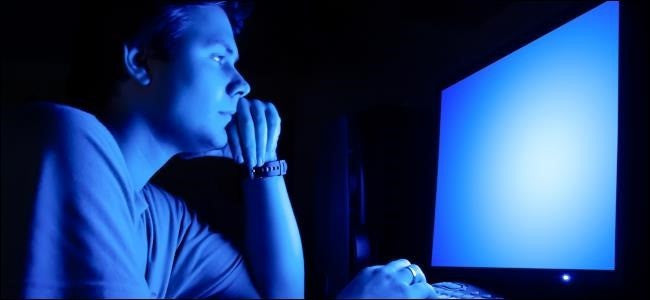
Image source: gazettereview.com
Teenagers are affected by the negative effects of not resting well the most. It is very common for teenagers to have electronic devices. Most teenagers have their own cellphone, maybe a laptop or computer for school, and a tablet just for fun. With access to all of these devices it is no wonder many teenagers have a hard time waking up in the morning.
Adolescents have a harder time sleeping because their circadian rhythm is naturally shifting as they grow. With this shift their body does not wind down until later in the night. Using electronics to help them calm down and get ready for bed is actually hindering them from getting good sleep.
With teenagers their body is not made to go to sleep early and wake up early. Their sleep cycle is set for a much later time even though as a society we expect them to wake up as early as dawn. They are being set up for failure and their devices are not helping the problem.
Exposure
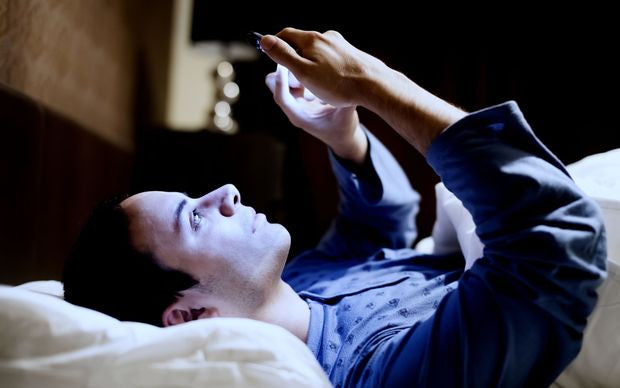
Image source: radionz.co.nz
There are many ways to be exposed to blue light. The sun is the biggest way and the only natural way to help synchronize your circadian rhythm. The common devices that give off blue light are cellphones, tablets, and laptops. Exposure does not have to be direct for our bodies to react to it.
If there is a television in the room and you are not watching it you will still have blue light exposure. With enough blue light exposure, even if it is indirect, you will still have trouble sleeping. The amount of time for your body to adjust after you have stopped using a blue light emitting device is about equal to the time you were using the device.
If you were checking emails for twenty minutes before bed you are going to see about a twenty minute delay in getting to sleep. Many people use mundane tasks like checking email or playing an easy game on their tablet to help fall asleep. This habit can cause your sleep rhythm to be disrupted and your health to be in greater risk for complications.
When you are using devices like cellphones or tablets you are getting more direct exposure to blue light. These devices are used closer to your body and you are looking directly at them during use. Therefore there is more blue light absorbed during these uses.
The effect that blue light has on our bodies has been studied for a long time. It has only been more recently we have looked electronics blue light effects. Since the 1950s there have been studies about the blue light effect.
These studies focus on how blue light changes the way our body produces melatonin and how this in turn affects our circadian rhythm. Throughout the years the effects of circadian rhythm being disrupted has lead us to know that we are damaging our health without sleep.
How Our Bodies Take In Blue Light
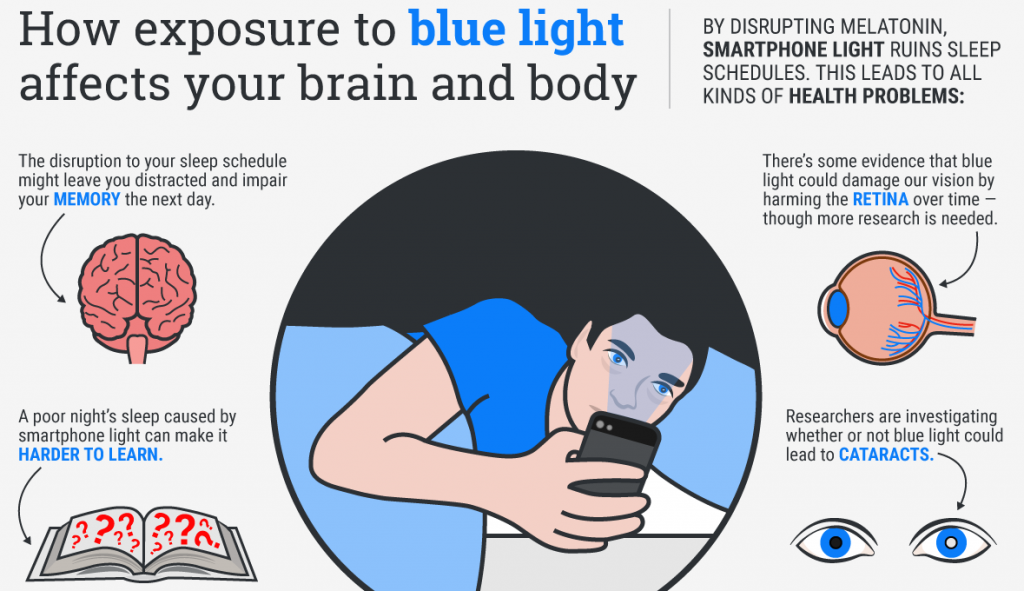
Image source: collective-evolution.com
When viewing an electronic device or out in the sunlight you are taking in blue light through your eyes. The eyes have mechanisms that allow us to view light. There are rods and cones that are the eye's light sensors.
Color is perceived with the help of cones. Rods handle our night time vision. They help us see when something is moving and work with our peripheral vision.
Even though they are at work in our eyes while we are looking at an electronic device they are not affected by the blue light. The third sensor in our eyes that was just discovered in 2002 is called intrinsically photosensitive retinal ganglion cells.
These sensors do not work as intricately as rods and cones and do not directly affect our sight. However, they are able to notice when there is a change in light.
When there is a change in light these sensors send this information to the pineal gland. This signals the gland to cease all work on melatonin if there is blue light present. Once the blue light is not longer being viewed the signal will be sent that the gland can start production again.
If you still need to use your phone to fall asleep do not worry! There is a way to help your body still know it is time to go to sleep while finishing your favorite game.
While many of us have our phone's brightness level pretty high we do not actually need that much light to see. If you set your phone's light as low as it can go and you can still see the screen you should be okay to go to bed.
A lower amount of light emitting off your phone will help to stop your brain from thinking it should stay awake. Try to have the device as far away as possible as well. This helps to keep the amount of light entering your eyes to a minimum.
Conclusion
With the amount of exposure people are getting to blue light there will likely be more studies of this effect. As more is known about blue light there will be more ways to help keep our circadian rhythm in balance. A balanced circadian rhythm is the key to getting a good night's rest and staying healthy.
For now remember to put down those devices before bed. If you still want to use your device turn the brightness down and hold it further away from you. This will help your body know it is okay to still produce melatonin so it can wind down.
It is especially important to help your adolescents learn how to avoid electronic devices at night. They are much more susceptible to the effects of blue light and will have a much harder time sleeping. For them to stay healthy and concentrated in school they need to have a great night's rest.


